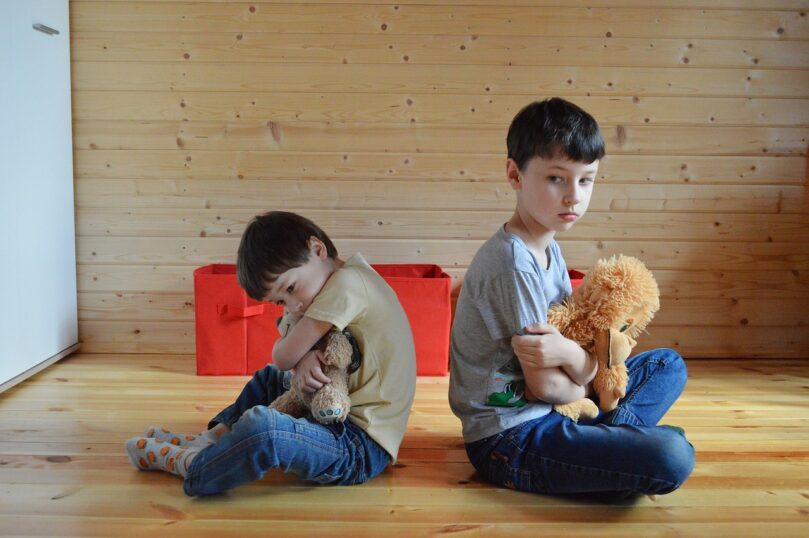Disclaimer: Devoted Grandma is reader-supported. If you purchase anything through my site, I may receive a small commission (at no cost to you). Thank you.

As grandmothers, our love for our grandchildren is deep and unwavering. We see them as perfect just the way they are, but the reality is that they may not always feel that way about themselves. Children and teenagers, even the most confident ones, have insecurities—some that they openly express and others they keep buried inside.
Sometimes, without realizing it, we may say or do things that touch on these insecurities, even when we mean no harm. That’s why it’s important to be mindful of the things our grandchildren might be sensitive about. With a little thoughtfulness, we can offer support, encouragement, and reassurance instead of unintentionally deepening their worries.
Here are 15 common insecurities grandchildren struggle with and how we, as grandmothers, can be cautious and compassionate in our approach.
1. Their Physical Appearance
As children grow, they become more aware of their looks, and unfortunately, the world around them often makes them feel they need to look a certain way to be accepted. Whether it’s their weight, height, acne, hair type, or even the shape of their nose, kids are often hyper-aware of their features.
As grandmothers, we must be careful not to make comments—however well-intentioned—about their bodies. Even something as simple as “You’re getting so tall!” might be embarrassing if they feel self-conscious about their height. Instead of focusing on physical appearance, we can praise qualities that build confidence, such as kindness, creativity, or determination.
2. Feeling Like They Don’t Fit In
Children and teens often feel pressure to fit in, whether it’s at school, in social groups, or even within the family. They might feel different due to their interests, personality, or even things they can’t control, like their background or family situation.
Instead of pointing out differences, we can reassure them that their uniqueness is something to be proud of. Saying things like, “I love the way you see the world,” or “You bring something special to every situation” helps them embrace who they are rather than trying to blend in.
3. Not Being Good Enough in School
Even the brightest children sometimes doubt their intelligence. Whether they struggle with a subject or compare themselves to classmates, school performance can be a major source of insecurity.
Instead of asking, “What grade did you get?” we can shift the conversation by asking, “Did you learn something interesting today?” This helps them focus on growth rather than just results. Encouraging a love of learning rather than a fear of failure can make all the difference.
4. Their Talents Not Being Enough
Some children feel that unless they are the best at something—whether it’s sports, music, art, or academics—they aren’t good enough. They may shy away from activities they enjoy for fear of not measuring up.
Rather than only praising achievement, we can celebrate effort. “I love seeing you practice” or “You’re improving every time I watch you” reinforces that dedication and passion matter more than natural ability.
5. Their Social Life
Friendships can be complicated at any age, but for children and teenagers, they can feel like everything. Feeling left out, struggling to make friends, or facing social anxiety can make them feel like they don’t belong.
Instead of asking, “Do you have a lot of friends?”—which may highlight their insecurities—we can ask, “Who made you laugh today?” This helps them focus on the quality of their relationships rather than the number of people in their circle.
6. Their Family Situation
Children from divorced families, blended families, or homes with financial struggles may feel insecure about their circumstances, especially if they see others with seemingly “perfect” families.
Rather than focusing on comparisons, we can reassure them that love defines a family, not structure. Letting them know that their family is just as valuable and special as any other helps ease their worries.
7. How They Sound When They Talk
Some children feel self-conscious about their voice, especially if they have an accent, a lisp, or a stutter. Even those with no speech difficulties may dislike the sound of their voice.
Instead of drawing attention to it, we can focus on what they say rather than how they say it. Letting them know that their words and thoughts matter can help them feel more confident speaking up.
8. Their Fashion Choices
Fashion is often a form of self-expression, and while we may not always understand modern trends, our grandchildren put a lot of thought into their clothing choices.
Rather than critiquing their outfits, we can say, “You look happy in that” or “That color really suits you.” This allows them to feel confident in their choices without feeling judged.
9. Being Compared to Siblings or Cousins
Comparisons can be incredibly damaging, even when we don’t mean them to be. Saying, “Your brother was so good at math at your age” or “Your cousin is really athletic” might unintentionally make them feel like they aren’t measuring up.
Instead, focusing on their individual strengths and praising them for who they are—rather than how they compare—builds confidence and self-worth.
10. Their Fears and Anxieties
From fears of the dark to bigger worries about the future, children’s anxieties should be taken seriously. Saying, “That’s nothing to worry about” may seem reassuring, but it can make them feel like their fears aren’t valid.
A better approach is, “I understand why that would be scary. Let’s talk about it.” This makes them feel heard and supported.
11. Being “Too Emotional”
Some children are naturally more sensitive than others, and in a world that often values toughness, they may feel like something is wrong with them.
Rather than telling them to “toughen up,” we can say, “It’s okay to feel things deeply. It means you care.” This helps them embrace their emotions rather than feel ashamed of them.
12. Struggling with a Hobby or Skill
Learning something new can be frustrating, and some kids quickly feel like they’ll never be good at it.
Instead of focusing on immediate success, we can remind them that all skills take time. Saying, “Every expert was once a beginner” encourages perseverance.
13. Not Looking Like Their Peers
Children notice their differences early, whether it’s hair type, body shape, or even needing glasses. These insecurities can grow if they feel like they don’t match a certain beauty standard.
A grandmother’s words can be powerful: “You are exactly as you’re meant to be. The world needs people just like you.”
14. Failing at Something
A bad grade, a lost game, or a mistake in a performance can feel like the end of the world to a child.
Instead of minimizing their disappointment, we can validate their feelings and help them see failure as part of growth: “That must have been tough, but mistakes help us learn.”
15. Not Feeling Important
At the root of many insecurities is the fear of not truly mattering. Grandmothers can counteract this by making sure their grandkids always feel valued.
A simple “I love you just the way you are” can be a lifelong source of comfort.
Final Thoughts
Children’s insecurities may change as they grow, but what remains constant is the power of a grandmother’s love. By being mindful of our words and actions, we can help build our grandchildren’s confidence instead of unknowingly adding to their worries. Our encouragement, understanding, and unwavering support can help them see their worth—even in moments when they doubt it themselves.
Would you like me to refine any section or add more real-life examples?

